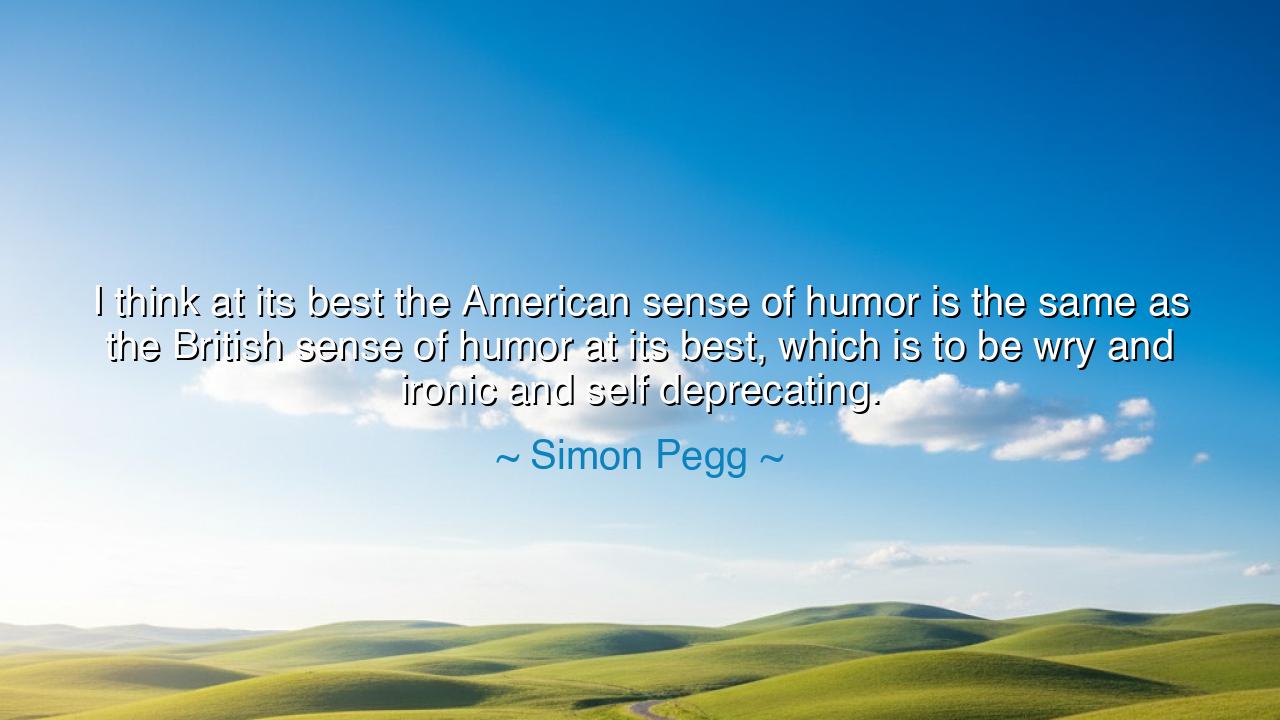
I think at its best the American sense of humor is the same as
I think at its best the American sense of humor is the same as the British sense of humor at its best, which is to be wry and ironic and self deprecating.






The words of Simon Pegg—“I think at its best the American sense of humor is the same as the British sense of humor at its best, which is to be wry and ironic and self-deprecating”—speak of a quiet and noble wisdom. They reveal that the greatest humor does not spring from cruelty or arrogance, but from self-awareness, from the courage to laugh at one’s own folly, and from the humility that sees truth in imperfection. Pegg, a craftsman of both wit and heart, reminds us that laughter, when pure, is a bridge between nations, cultures, and souls. It is a mirror polished by irony and warmed by kindness.
In his reflection upon both American and British humor, Pegg calls forth the shared heritage of two great storytelling traditions—each born of hardship, each sustained by laughter. The British, through centuries of empire and rain, learned the power of irony to endure the absurdities of life. The Americans, through rebellion and reinvention, learned to find humor in their own contradictions, their own wild hopefulness. When both reach their finest form, Pegg tells us, their laughter becomes one—a laughter that is wry, knowing, and self-deprecating, the kind that disarms pride and uplifts the spirit.
In the ancient world, the philosophers of old knew this form of humor as the laughter of wisdom. The Greeks spoke of “eironeia,” from which we inherit the word “irony”—the art of speaking truth through jest, of humbling the mighty through gentle mockery. Socrates himself wielded irony as a weapon of light, pretending ignorance so that others might see their own blindness. Yet beneath his humor there was no cruelty, only compassion. He laughed not to humiliate, but to awaken. So too does Pegg’s quote echo this eternal truth: that to laugh at oneself is the first act of enlightenment.
Consider the story of Winston Churchill, the British statesman whose wit was as mighty as his will. When insulted by a rival who said, “You’re drunk,” Churchill replied, “And you, madam, are ugly. But tomorrow, I shall be sober.” The crowd roared—but beneath the jest was no malice. His humor was wry, an armor of irony against the storms of history. Across the ocean, the American president Abraham Lincoln wielded the same kind of grace. When accused of being two-faced, he smiled and said, “If I had two faces, would I be wearing this one?” Such self-deprecation did not weaken him—it made him immortal.
This is what Pegg speaks of when he honors the self-deprecating spirit: the laughter that humbles without destroying, that reveals strength through vulnerability. In a world too quick to boast and too slow to reflect, such humor is the language of the wise. It whispers to us: “Take your work seriously, but never yourself.” The wry man walks through chaos smiling, for he knows that pride is a mask that cracks beneath the weight of truth. His laughter, though quiet, is the laughter of freedom.
To understand irony is to understand life’s contradictions—that joy and sorrow, success and failure, are intertwined like the roots of an ancient tree. The ironic spirit accepts that life will never be as perfect as we wish, yet finds beauty in its absurdity. It turns suffering into story, embarrassment into wisdom. This is why both nations, in their finest humor, reveal the same heart: the ability to laugh with understanding, not with cruelty. For to mock oneself is to show that the ego has been conquered, and the soul stands unafraid.
Let this teaching be passed on: embrace wryness, cherish irony, and practice self-deprecation. When life wounds you, smile with quiet knowledge. When you are praised, bow your head and laugh at your own frailty. For this is not weakness—it is strength beyond measure. The man who can laugh at himself is beyond the reach of mockery, for he has already made peace with his own humanity.
And so, as Simon Pegg teaches, let our laughter be noble. Let it not wound, but heal; not divide, but unite. Let it carry the wisdom of both nations and the spirit of all ages. Be wry in adversity, ironic in triumph, and self-deprecating in success. For in that laughter—gentle, knowing, eternal—we find the truest reflection of the human soul: flawed, foolish, and yet, wonderfully divine.






AAdministratorAdministrator
Welcome, honored guests. Please leave a comment, we will respond soon